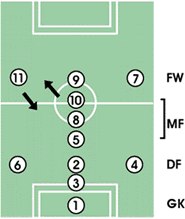| Formation | 1970 Irregular 4-3-3 System |
 |
In the Mexico World Cup in
1970, Brazil cleared itself of the disgrace it had suffered in 1966. Having wingers with
different styles yet both magnificent in ability, Jairzinho on the right and Rivelino on
the left, Brazil often cut into the opponents' field from the side and wove elegant
passes. With superb technique and motivation, the team was a showcase of "attack
football" at its best. Rivelino added depth to the attack by perfecting the combined role of a winger and a midfielder, which later became a Brazilian tradition. Pele sometimes went up to the forward position, making the formation 4-2-2. The type of defense was a sweeper system: three defenders were each allocated an opposing forward to mark, and the remaining defender (3) was the "sweeper," who was at the last defensive line and free to cover other defenders, not having any predetermined allocation. When they saw a chance to attack, the left and right-side backs joined the offense quickly. Brazil captured the championship, winning all six games, scoring 19 goals and relinquishing only seven. Their irregular 4-3-3 system proved a great success. |